#did he have to give speeches during assemblies???
Explore tagged Tumblr posts
Text
So since Gary was the head boy did he have to host/plan the pep rallies??? Cause if so that is absolutely hilarious
#did he plan silly little events???#did he have to give speeches during assemblies???#i wish they had homecoming and prom missions that would’ve been so fun#Imagine having questions about school policies and you have to talk to Gary about it 😭#bully canis canem edit#bully rockstar#bully game#bully cce#rockstar games#gary smith#HELP IM ITCHY#poor Petey now has to take on the head boy’s responsibilities 😭😭😭😭
45 notes
·
View notes
Text
One of the most memorable speeches I've ever heard was given at my beloved's graduation. They attended a pretty crunchy school natural medicine. They went for acupuncture but they also had many degrees including nutrition, naturopathic medicine, and most importantly to this story: midwifery.
The common consensus across campus was that the midwives operated on their own frequency which is a nice way to say they were usually really weird, even by the standards of a pretty alternative crowd of people. Not weird in a bad way. But weird nonetheless. They straddled the boundary between life and death and it changed them.
I had never experienced a midwife before the ceremony which is why I didn't think anything of the fact that a midwife stepped up to give the graduation speech. My friends nearby had a stir of repressed amusement and elbowing each other which did puzzle me slightly.
The speech began as a story, which I heartily approved of. The midwife related an experience in which a woman told her that during her first birth she had screamed too much and used up her energy in that instead of pushing and the midwife, to the collective masses assembled to watch a solemn ceremony, said, "I told her this time she would need to scream with her vagina."
The audience was slightly stunned by this, myself included. I scanned the crowd to see dropped jaws and wide eyes. It was such a bold statement to make in an academic setting and no one quite knew what to make of it.
The midwife continued unperturbed.
She related that many dads didn't know what to do during the birthing process and that this particular dad chose to chant over and over, "You're gonna be huge, you're gonna be huge," as his wife screamed with her vagina to birth their child. The midwife mused that she didn't know if he was talking to their child or his wife or if he even registered what he was saying in that moment.
Then the subject strayed toward how the student body had strained and striven toward this goal, this endgame that was the result of sleepless nights, hard work, and camaraderie. The speech seemed to have moved onto more solid ground and traditional graduation reminiscences. The crowd settled, thinking the worst had passed.
But as the midwife wrapped up she said, "As you go forth into the world, pushed out by this noble institution to help the masses, just remember one thing," she paused and the audience held their breath while the beat drew out before she finally whispered:
"You're gonna be huge."
There was a roar of astonished laughter as her speech neatly tied their graduation into a metaphor for being birthed unto the world and we finally understood the point of her anecdote.
The speech lives in infamy in all our collective memories. Years later my beloved's dad will still be like, "Remember that bizarre graduation speech?"
And it was. It was bizarre. But I'll say this. I've attended a lot of graduations, and I don't remember any of the speeches half so well as I do that one.
5K notes
·
View notes
Text
Survey: Who is your favorite feminist revolutionary of the frev (or at least someone who contributed to women's rights)?
In this survey, I have deliberately chosen a representative from each different faction.
On the Girondist side: Marquis de Condorcet The revolutionary who campaigned for gender equality, one of the few in his era. He is impossible not to mention in this discussion.

On the Dantonist side: Camille Desmoulins He advocated for the rights of married women to administer their property in 1793. In issue 14 of his journal Révolutions de France et de Brabant, he speaks highly of Théroigne de Méricourt and writes the following passage: "At the request of Mademoiselle Théroigne to be admitted to the district with a vote of consent, the assembly followed the president’s conclusions, thanking this excellent citizen for her motion; a canon from the Council of Mâcon having formally recognized that women have a soul and reason like men, they cannot be forbidden from making as good use of them as the speaker did; he will always make Mademoiselle Théroigne, and all women of her sex, free to propose what they believe to be advantageous to the homeland."

For the Maratist group: Jean-Paul Marat The journalist from L’Ami du Peuple often defended women who were victims of domestic violence, encouraging them to flee their homes and denounce those who abused them. Here is an excerpt from his writings found in the excellent book Madame Marat: A Heroic Life in the Turmoil of the French Revolution by Stefania di Pasquale: "Women are more inclined to tenderness than men. During their childhood, children are expected to oppose themselves to shame, but as soon as they come to the age in which women start listening to us, we hurry to conquer them and to excite their imagination; we focus all of our thoughts to unleash their senses. Hasn’t the time come to create a sweet bond with them? Men have always chosen while women have always accepted! How many foolish parents sacrifice the happiness of their daughters? Forced to yield the object of their heart forever, they become unable to love again, seeing only misfortune in their future." He also defended prostitutes.

For the Cretois group: Charles-Gilbert Romme The revolutionary mathematician, founder of the revolutionary calendar, also worked for certain women's rights. He founded a mixed club with Théroigne de Méricourt, and in a report on public education dated December 20, 1792, he advocated for girls to have access to republican schools. He made the following remark: "They should not be strangers to social virtues, since, in addition to needing them for themselves, they can develop or strengthen them in the hearts of men. If, in the natural and social order, man is called to execute and act, woman, by an imperious and necessary influence, is called to give the will a stronger and more vehement impulse." Although Romme’s feminism had limits, as seen in his statement: "The secondary schools in question are not for both sexes."

For the Robespierristes group: Georges Couthon One of the best-known members of the CPS in Year II, also spoke in favor of women's rights to share property administration in August 1793, as seen here: source. Additionally, he allowed his wife to give a speech at the Federation Festival in Clermont-Ferrand in 1790, before he gave his own speech, as seen here: source.

For the Enragés group: Jacques Roux Here is an excerpt from Markov Walter on this Enragés leader: "All the revolutionary parties tried to involve women, while, with the exception of the Enragés, they sought to exclude them from any real political activity. Jacques Roux considered them the decisive reserve of the Revolution. 'Victory was indisputable as soon as women joined the sans-culottes.'"

For the Hébertist group: Jean-Nicolas Pache This former Girondin minister of the War , who became an Hébertist and later Mayor of Paris, founded the Société patriotique du Luxembourg club, which, according to Louis Devance, "admitted women from the age of fourteen, with the same formalities as men, but their numbers could not exceed one-fifth of the total members; they were eligible for the same positions in the society, excluding the office roles."

For the Babouvist group: Gracchus Babeuf Babeuf wrote a letter in favor of gender equality to Dubois de Fosseux in 1786, as seen here: source. He supported the full participation of women in political clubs and paid tribute to the women of the French Revolution in his journal article: "Women dedicate their entire days to prevent us from starving," and said of them, "But beware, women, whom we have degraded, without whom, however, and without their courage on the 5th and 6th of October, we might not have had freedom!" He even remarked to one of his colleagues: "The advice you give us regarding the role women can play is sensible and judicious; we will take advantage of it. We know the influence that this fascinating sex can have, who, like us, cannot endure the yoke of tyranny and who are no less courageous when it comes to breaking it." He believed that the homeland had everything to gain from exploiting women’s talents in politics.

For the Thermidorian group: Armand Benoît Joseph Guffroy When he is not making false accusations against Élisabeth Le Bas or showing appalling behavior by kicking his former collaborator Marie-Anne Babeuf out after a violent argument, or writing poorly about Lucile Desmoulins and Marie-Françoise Hébert(euphemism) , one can find some quality in Guffroy's progressive views on women's rights. He wrote: "I had proposed to admit women to the primary assemblies, to deliberate on the choice of municipalities, and I still believe that my two separate ballots and my posted ballots would disturb all the conspiracies. If one is wise, one will come back to it; and I predict that we will never have a public spirit, public morals, if women do not participate in the administration as I have proposed. The National Assembly admitted to swearing the constitution, those who were in the tribune on the 4th of this month. Why would we separate them from the public good? The queen promised to raise her son in the principles of constitutional liberty; all French mothers must publicly swear this civic oath: without that, I repeat, no morals, no morals, no fatherland. Frenchmen, prove that you are men, by giving back to your wives all their dignity; French women, prove that you are worthy of giving birth to a race of free men."
Sources:
Antoine Resche
Louis Devance Le féminisme pendant la révolution française
Walter Markov
Stefania di Pasquale
Jean-Marc Schiappa
Charles-Gilbert Romme, "Rapport sur l’instruction publique, considéré dans son ensemble, suivi d’un projet de décret sur les principales bases du plan général, prononcé devant la Convention le 20 décembre 1792"
Thank you @anotherhumaninthisworld without whom I would not have been able to see the writings of Couthon, Guffroy, and Desmoulins in favor of women's rights.
#frev#french revolution#condorcet#camille desmoulins#jean paul marat#charles gilbert romme#Jacques Roux#Jean-Nicolas Pache#gracchus babeuf#Guffroy#It was difficult to find a somewhat more reasonable figure for the Hébertists in terms of women's rights#as the focus on women's rights was so limited.#Even more for the Thermidorians as we know what happen to the womens who were driven from the assembly with whips#but we can at least give this quality to Guffroy#My goal was at least one representative from each faction#It seemed more fair and “fun” to me.
106 notes
·
View notes
Text
'Go to hell' is basic. 'I hope one of your favourite characters in all of fiction constantly gets their personality and motivations misrepresented in posts that go viral online, leading to persistent misunderstanding of them as all of their flaws are excused and their character arc is flattened' is real. It's possible. It's terrifying. It happened to me. Again.

(Obviously not my screenshot as for starters I wouldn't 'like' such a thing... but anyway I quit that hideous website long ago. This is yet another terrible Mr Darcy take courtesy of Pinterest... why is it always on there that I find these horrendous takes?!)
At what precise point in the narrative was Mr Darcy ever shy?
He certainly seemed to have no problem with speech when it came to insulting Elizabeth at the Meryton assembly when he publicly insulted her, nor was he so overcome by 🥺social anxiety🥺 that it prevented him from making it abundantly clear that he was singling her out as the subject of his disparaging remark:
'Which do you mean?' and turning round [Mr Darcy] looked for a moment at Elizabeth, till catching her eye, he withdrew his own and coldly said: 'She is tolerable, but not handsome enough to tempt me; I am in no humour at present to give consequence to young ladies who are slighted by other men...'
But Darcy was not simply awful about Elizabeth in her presence. Oh no, he was also quite happy to insult her looks to his friends;
Mr Darcy had at first scarcely allowed her to be pretty; he had looked at her without admiration at the ball; and when they next met, he looked at her only to criticise. But no sooner had he made it clear to himself and his friends that she hardly had a good feature in her face...
As well as making Elizabeth and her family the butt of his jokes, as Caroline Bingley later informs us:
'I remember, when we first knew her in Hertfordshire, how amazed we all were to find that she was a reputed beauty; and I particularly recollect [Mr Darcy] saying one night, after they had been dining at Netherfield, "She a beauty!—I should as soon call her mother a wit."'
Nor did Mr Darcy (who we are explicitly told has no difficulty making long speeches) have any problem with telling Elizabeth to her face exactly how far he considered her beneath him during his proposal to her:
[Darcy] spoke well; but there were feelings besides those of the heart to be detailed; and he was not more eloquent on the subject of tenderness than of pride. His sense of her inferiority— of its being a degradation—of the family obstacles which had always opposed to inclination...
All while he insulted her intelligence as he insisted that he's Such A Catch that he could have easily flattered his way into her heart:
These offenses might have been overlooked, had not your pride been hurt by my honest confession of the scruples that had long prevented my forming any serious design. These bitter accusations might have been suppressed, had I, with greater policy, concealed my struggles, and flattered you...
Idk... he doesn't seem so shy to me!
The only way any of this behaviour could be accidental was if Darcy was a full-time somnambulist. But given that he doesn't use that excuse in his letter, I'm inclined to believe that wasn't the case...
Also, I feel like shy and aloof is sort of a contradiction. Shy people are less inclined to be outgoing and talkative by their very nature, but it does not necessarily follow that they are rude and if they are, innate shyness is no excuse to hurt anyone's feelings. To be aloof, to me, seems to be a conscious choice rather than merely someone's nature. So, while I would agree that Darcy is aloof, he absolutely knows how to speak to people; he knows how to be polite. But he chooses not to be, because he thinks everyone else is beneath him...
Mr Darcy's choice to be rude and treat those that he viewed beneath him with utter contempt, as they were not worth the effort it would require from him to simply be civil, is such a fundamental aspect of his character. It is absolutely vital to grasp if you are ever to fully appreciate Pride and Prejudice for the masterpiece that it is.
Otherwise there's no pride and no prejudice... so what are we left with... 'and'? Doesn't exactly sound like a page-turner to me...
#pride and prejudice#jane austen#mr darcy#elizabeth bennet#fitzwilliam darcy#classic lit#my analysis#i can't believe i have to say it again.#let darcy be flawed you cowards#!!!!!!!#and i fear i know WHAT is responsible for OP's as well as the 42k people who liked it's misunderstanding of darcy#j** w***** you will pay for your crimes#but even if it comes from that i am still baffled because WHY would you want to excuse a man calling you 'barely tolerable' to his friend#it doesn't make his behaviour okay whatsoever#that film has done not only irreparable damage to the way pride and prejudice is viewed by the general public#but also personally to me and my sanity#and i know what is the greater transgression.. ....... .
41 notes
·
View notes
Text
Bug-a-Bye and Goodnight
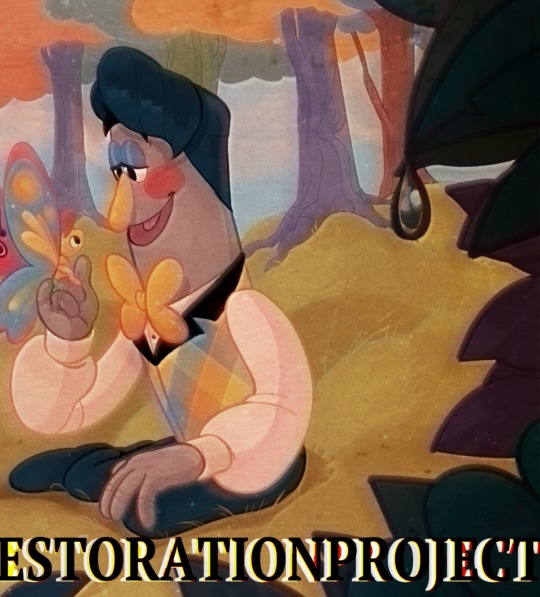
As always, I have edits:
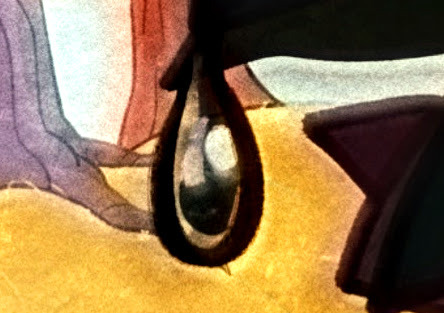
This will make more sense at the end.
I came across some theories about this song, and wanted to look at it in depth.
We are reading with the understanding that he may be referring to Eddie.
[A gentle piano and bassoon track begins playing.]
The sun is low, it’s cold and dark,— end of season, but could also be a reference to night and danger after dark
Just wind and snow, I must remark,
The bugs all head to slumberland,—interesting given the use of toyland, also the commercial about remderem/insomnia (some must sleep but Wally is in the opposite state. Too aware?), but could be a reference to death, like “the big sleep”
Some might find it sad, but I understand,—on face value, he will miss his friends, but knows that it is inevitable.
Even if I might not be able to see you,—can’t see Eddie because he is gone/buried
I know it’s for the best, I can’t keep you,—Eddie staying would lead to serious consequences for Eddie
It’s time for all of you to get some rest,—after what we saw Eddie go through, I bet he would be better in a different state
To tuck you all into your arthropod nests,—bug stuff; also Julie's hibernation?
At this point, those last few lines could refer to a sort of death for Eddie. Almost like frank can preserve him in some way by giving him a death in this universe. If we are talking puppet world, which we did see in commercials, most of Eddie’s anxiety happened in that state. So, can Frank give Eddie a suspended or death like state in one of the layers of reality and he is preserved in storybook world or our real world?
With one last check, that nothing is amiss,
I can see you safe into your chrysalis,—this reads that he will put Eddie into a different state of being that he can come back from. The coming back is my interpretation only at this point because I assume frank wouldn’t choose death for him or would for sure be hurt by Eddie’s death. Things would have to be very bad if true death is a better option for Eddie.
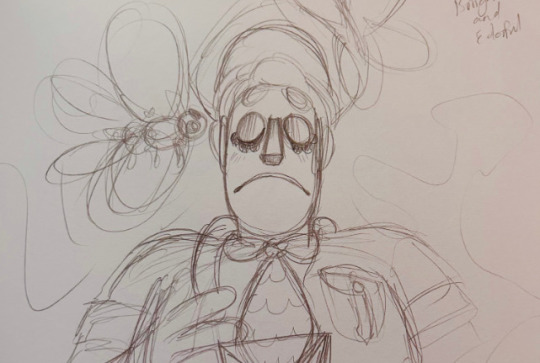
Also, it hearkens back to the horror butterfly image. Another also, caterpillar to butterfly, an insinuation of emedging into a new form. I don’t see allusions to Howdy in here, but I suppose it is possible that this could refer to more than one neighbor and Frank is taking them all out.
As you snuggle down into your dirt,—reference to being buried?
I want to assure you that I won’t be hurt.
This clarifies that it is a sleeping type state, not death. Ok, here is we’re Eddie’s Halloween costume comes in. Frankenstein, changed from the Scarecrow in earlier art (presumably from wizard of oz). Interesting thing about scarecrow vs. Frankenstein is that we see scarecrow taken apart during that film and Frankenstein is famously assembled from parts of different people. Interestinger is the fact that they are both afraid of fire. (I love that Young Frankenstein shows up more than the original in a search.)

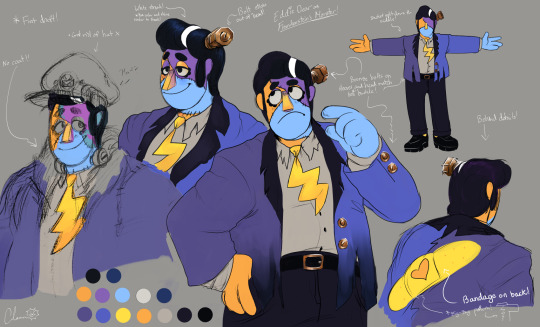
Frankenstein (and scarecrow) are both put back together, but for Frankenstein it seems more of a new being, not just a reassembling. Frankenstein (aka frankenstein’s monster) is a thinking, speaking individual that was horrified at the situation he was in. Frankenstein in the book murders to punish his creator for the immorality of creating him and the resulting loneliness that the monster feels. As such, the choice is very interesting. If the puppets of welcome home come to be aware or sentient, I wonder how they would feel about Ronald Dorelaine or their situation?
If the movie version is the focus of Eddie’s costume choice, then he would be a potentially thinking and feeling being (he is afraid of fire), but without further evidence we don’t know his thoughts.
Scarecrow is a guy without a brain, with the power of speech, so a kind of opposite. I think they all end up just needing to be confident, which is why some shyster from the Midwest is able to help. This almost seems to be more in tune with Eddie's character--Eddie has a tendency to appear kind of ditsy, is constantly being dismissed by others. In the end, we find out he is actually smart but lacks confidence. I can see that being true for Eddie as well.
If I had to pick out a character for Frank, it would be the Tin Man. Poppy is the Cowardly Lion, Wally is Dorothy. Home is Home. There are more parallels here than I was expecting. Howdy is the Wizard, Julie can be Glenda, and the Wicked Witch...is kind of no one? Sally can be a flying monkey. She works my nerve. Also, the whole spying thing was done by the monkeys in the movie.
But now that I am thinking about it, this comparison makes a lot of sense, in terms of the complex relationships, as well as the levels of reality that you find in Wizard of Oz. A big event leads to a shift in the understanding of reality, and the lead finds themselves in a very colorful world that doesn't much resemble their own, but is very flashy, has songs, beloved characters, and a sense of danger. There are some things when thought about in the context of real life, or the black and white portion of Wizard of Oz, would be truly frightening.
Of course, Wizard of Oz shares a lot of parallels with Alice in Wonderland, which also seems somewhat related. In terms of source material, the Wizard of Oz is considered to be a parable that expresses the thoughts about US economic policy in the 1890's. This is a theory that you can read more about here: https://en.wikipedia.org/wiki/Political_interpretations_of_The_Wonderful_Wizard_of_Oz
It isn't super related, and not everyone believes that this is the case. However, it seems to be a very American type story, no matter what you believe, that touches on the experience of normal people while much larger forces lie and fuck around with everything.
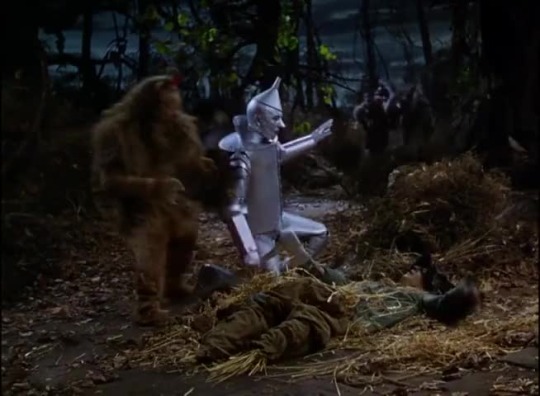
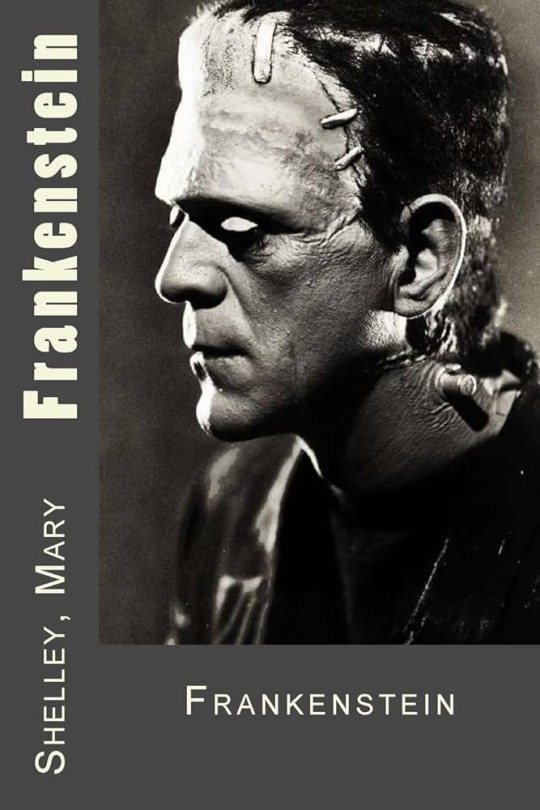
As the holidays begin to approach,
I gently kiss, each and every roach,—kisses for Eddie. We have seen a realistic roach on the secret page with the mishmash of one script where Wally is deciding what to draw
I made sure to keep, my garden cozy,
So you can safely sleep, in fallen posies,—this whole stanza shows a desire to and promise of a quiet death and maybe even a maintained grave. I looked up posies to see where Eddie could potentially be buried. Posies refer to a nosegay, or small bouquet of flowers. It was a Victorian secret code thing, a way to declare love or even reject people based on flower and color. One that sticks with us in the form of red roses signifying love. On the map, there is a cluster of yellow flowers to the side of Frank’s house. Not sure this counts as his garden, since it is on the other side of the house. Julie has a group of flowers behind her house, but once again, not his garden. No fallen flowers that I can ID.
When googling posey, this is what comes up. I felt that there was a flower called a posey, and these do look like the big yellow flowers by Frank’s house. If any flowers fall in updates, I am going to assume someone is buried there.
There is also the ring around the roses rhyme, which could relate, but I don’t really see a correlation.

It’s time to get comfortable in your honeycomb,
take your winter intermission in your garden loam,—dirt, burying again
neatly nestled from the cold in roots and rhi-ya-zomes, — cozy dead
sleeping side by side under stately stones,—2 dead? Headstones is the link I make there--OK, now look at the pic! (I know, it's a reach.)

…And I’ll be inside of my home,—frank is staying to oversee something. It reads like calming the person who will die. This seems to bolster that arguments that I addressed in the post about bugs on the previous website, that Frank is working against, or at least parallel to Wally. With the bugs, the whispering to Eddie, and using his first name, I think it is reasonable to suggest that Frank is working against Wally and/or Home.
Another potential clue is the hidden video with the clothespins where 1 is upside down. I have theorized that it is a reference to Barnaby dying, but it could be Barnaby and Eddie. Only one clothespin is shown upside down though, so Barnaby or Eddie?
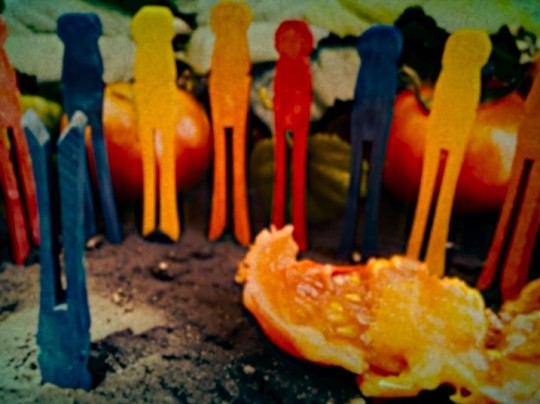
Regardless of how I feel you need to go away,
I’ll be the one to tell you, you just can’t stay,—he likes bugs but this is extreme of Frank, if he is talking about actual bugs
Thankfully I lack a sentimental sensibility,—true that, he generally seems calm.
I enjoy my Methodical Mundanity,—why is this capitalized? I looked and looked but I can’t find the origin of this phrase, though it came up a few times in random posts and articles. Clown does have a tendency to capitalize things that seem random. Me below is also capitalized. I listened as well, and I have to wonder why the singing is so bad? I don’t think the voice actors are bad at singing, seems like a deliberate choice to have reedy and unsteady vocals, pitch issues and pacing problems.
Where all that’s left is… Me.
So, this is a bit extreme for a song about hibernating bugs. I think that given our many references to bisecting or otherwise putting people into pieces (Eddie butterfly horror, frank in a pile of body parts, look I made a dog, and slinky Barnaby, now Frankenstein and Scarecrow) that we could be looking at death in a sense that works in one layer of reality. You disassemble a puppet, it is no longer a puppet. So what if Frank = Frankenstein and Eddie is Frankenstein’s monster? Frank can take him apart and put him back together in puppet reality?
If I had to guess, I am sticking with my working theory. Frank, as the smartest guy in the neighborhood, is the resistant force in the neighborhood. Wally/Home is/are the catalyst for the scary stuff. They are central to everything, physically and otherwise.
I have mentioned that in the last update, Sally and Poppy have the appearance of spies or managing Eddie. Given that Poppy doesn’t attend to party, I am anticipating that Eddie was isolated and watched by Sally during this planning period, where Wally and Barnaby walk the neighborhood to find out what Homewarming is. Given that it is said that Wally and Home instigated Homewarming, it is strange that everyone knows what it is except for Wally. It reads more as an attempt to achieve a goal, despite everyone knowing about the holiday. Even Julie is at the party, and she is supposed to be hibernating. Well, they don't say exactly when Julie hibernates (maybe there was something about her doing it after the holiday?) Anyway, Poppy isn't at Homewarming. She could be at home, but the book stating that they are all here seems like an attempt to cover up her absence. What is she doing? Snooping in the Post Office while Sally watches Eddie? Does Eddie want to go home for not feeling well or he has an idea of what is happening while he is gone?
Maybe Frank sees his boyfriend and comrade at arms about to get hit with something bad, so to preserve him and the opposition, he is going to disassemble him (cue Johnny 5) for protection.
In the past, Sonny (the Brazilian bird) was cast as the opposition to Wally, and included in a relationship with Frank. This work in particular comes to mind:
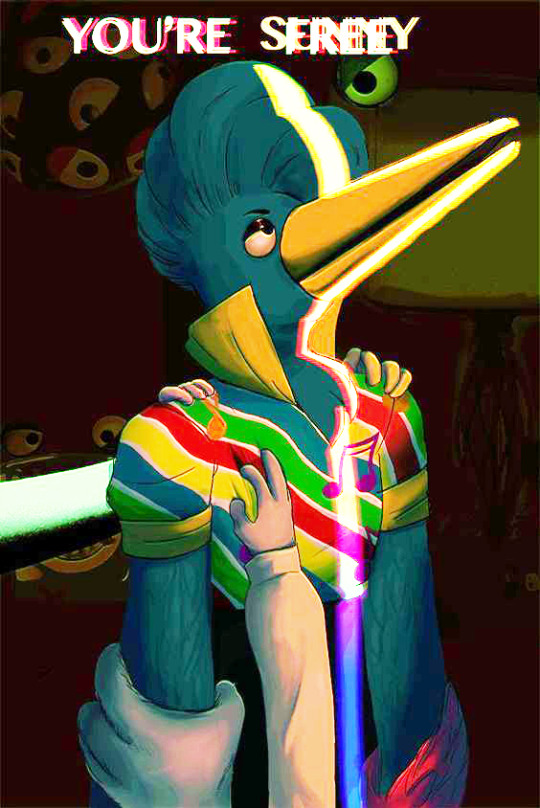
Clown has stated that they removed Sonny from the project due to the story changing from one with a hero, to one without, as that wasn't the story that they wanted to tell. What if, though, instead of Sonny being written out for the hero reason, there was another reason? What if we are seeing Frank taking on being the neighborhood's savior? He is just snarky enough to make it seem less like a hero situation and more because it was impacting his garden.
219 notes
·
View notes
Text
Chasing Your Shooting Star (1/19)
(A/N: I have been dying to write this fic for forever! And I finally got to a point where I feel comfortable enough in the new semester to start writing long fic again so here we go! Xavier University AU because I need this rn.)
Pairing: Uni Student|Xavier x Uni Student|Reader (fem)
Summary: Reader is starting her senior year at the prestigious Philos University. She's determined to keep her rank at the top of her class but a hiccup in her plans comes in the form of a handsome transfer student named Xavier.
Content warnings: Adult language.
Length: 3600
Chapters: (2) (3) (4) (5) (6) (7) (8) (9) (10) (11) (12) (13) (14) (15) (16) (17) (18) (19)
Read on AO3

Nothing in life came easy and it certainly did not come for free. You had been taught that nothing worth having came without some struggle. To be accomplished you had to earn it through hard work and a little sacrifice. Another necessity was letting go of distractions. If you did not need it, you could live without it.
Such a life is what led you here, Philos University of Cosmic Excellence. The single best university in all of Philos. Just to be accepted was a high honor and if you managed to survive getting a degree it all but guaranteed a spot anywhere you wanted to pursue a career. It was also the leading university in combat training, producing some of the best military agents in the world. The goal of the university was to create people that were forces of good in the world, as either a warrior or an academic.
It was a bright late summer day and you were starting your senior year at the university. Two more semesters and you’d be a graduate and the rest of your life would begin. It was exciting and daunting. So close to the end yet still so far left to go.
Your place at the university had been assured thanks to your outstanding academics. Ever since you were a child you had placed at the very top of your schools’ leader boards, both in combat and academics. You were a smart girl and you worked hard but you also knew to give credit where credit was due. The person who had pushed you to be the very best that you could be was your mother. She had instilled a great sense of personal pride and drive for success in you from an early age. Without her you don’t know where you’d be.
A testament to just how successful you could be was your maternal line. Your mother had become the dean of the prestigious university you now were set to graduate from. Even your great grandmother had been the founder of the most successful deepspace aircraft assembly company in the world and passed it down to your grandmother. Your mother would have inherited it if not for her becoming the dean instead.
Now there was you.
You strode across the campus, following the crowd of students for the welcoming ceremony. It was mandatory for everyone whether you were a new student or not.
You went to take a seat. You had to sit somewhere closer to the front or else your mother would get upset that she couldn’t see you during her welcome speech. Something about unity or something like that. You didn’t entirely see how it mattered since you were one person in a sea of people and it wasn’t like you had a special seat or anything.
But anyway, you found a seat and sat through the long welcoming speech from your mother and some other staff that laid out expectations, rules, well wishes and the like. About halfway through the speeches though you noticed that the blonde guy in front of you was starting to doze off.
Then a small snore came out of him and you realized that he had fully fallen asleep. You knew your mother wasn’t the most dynamic speaker but a little more respect! Also, if she saw someone this close to the stage falling asleep she was going to be pissed. You glanced at the stage making sure your mother wasn’t looking your way and kicked the back of his chair.
He jolted awake and stretched his head back to look at you. Your breath caught up in your chest for a second as you looked at him. He was rather handsome. He had a cute face at least. His large pale blue eyes widened slightly as he took you in. “Did I fall asleep?” he asked, his voice just as hazy as his demeanor.
You shook off the initial surprise and cocked your head at him. “Is that even a question?”
“Right…sorry.” he continued to stare at you.
Your face started to heat with the attention and you kicked his chair again. “Watch the dean!” you hissed at him.
“Oh right,” he said, as if broken from some spell and turned around. He sat straight and kept his attention forward for the rest of the welcoming ceremony.
You didn’t think more of the interaction and when everyone was dismissed you got up and made for the stage to greet your mother and give your usual praise for a good start of semester speech. “Thank you, my dear.” your mother said, smiling affectionately. “I thought I spotted some altercation between you and one of the other students during the speech though.”
She had seen that? You had been so sure she wasn’t looking. Then again the woman acted like she had eyes in the back of her head when it came to you.
“Oh it was nothing, the guy in front of me had misheard something you said and asked me for clarification.” the lie fell clunkily from your mouth. You weren’t used to lying to your mother and you prayed that your reputation would aid you. You didn’t want to admit the real reason that guy had been talking to you. He didn’t deserve the ire of your mother for something as small as nodding off during an admittedly very boring and repetitive speech.
“He asked the right person then, didn’t he? I don’t think there’s a person alive that knows my speech better than you.” she said and you let the tension in your shoulders ease.
“Yes. Shall we go to the welcome brunch?” you said and looped your arm with your mother’s to go to the awaiting meal in the main mess hall.
The day passed without any more incident and you were able to return to your room. While you prided yourself on having gotten into Philos University on your own academic merits there was one little perk you had gotten as the dean’s daughter. That was you had the privilege of a private dorm and adjoining bath. There was one building on campus that had a small number of this types of dorms and it was a lottery to see who got to have one for that semester. Being the dean’s daughter though your mother had been able to reserve you one for the extent of your academic career. At first you had fought it because you didn’t want special treatment but she had insisted and after the first semester you were glad to have the privacy.
The next day was the official start of classes. You got dressed and went to your first class. You got to the lecture hall and took a seat near the back. For as studious as you were you didn’t focus well in the front. You didn’t like the feeling of everyone behind you being able to look at you. You couldn’t say why but it just unnerved you in some way and so you tended to drift towards the back where seeing you was harder.
You sat down as other students filed in. You knew pretty much everyone by now. By the time you were a senior you had been able to single out who was in your degree program because they showed up in all the same classes. So it was no surprise to you when every single one of them kept at least a one seat buffer from you.
You tried not to think about it. Even if you did know why they avoided you. You weren’t exactly the most social person and over the years your preference for solitude had come across to the other students as being purposefully standoffish. It also didn’t help that your constant status as the top of your class on the ranking boards made people mad. No one had been able to tear you down from the pedestal you had built and it pissed them off that to them the real number one spot was actually still number two.
It was fine though. You didn’t need them. They’d just be a distraction. Besides, you could have as many friends as you wanted after you graduated. It was just important that you focus on your studies now. It was--
“Good morning. Is this seat taken?”
You looked up, startled that someone was addressing you and saw the guy from the welcome ceremony standing next to you point at the desk to your immediate left.
“Oh uh, no. It’s all yours.” you said.
“Thanks.” he sat down.
Why was he sitting back here? There were plenty of seats still available everywhere else. Then again, you didn’t recognize him. This was a core class for your program so if he was in your program you hadn’t seen him before. Could he have been a new student? This was an intense class so it was only recommended to be taken by student in their senior year since they’d have had time to understand the material from the years before. So either he was a transfer student, he was a regular student with a huge makeover that made him unrecognizable, or he was someone who was woefully unprepared for what was about to happen in this class. You knew this teacher, this teacher was your advisor and she pulled zero punches when it came to her classes and if this guy didn’t have any kind of foundation to stand on he was going to drown immediately.
The class began and you couldn’t help stealing glances at him. He didn’t seem to be struggling with the work, took notes diligently, paid attention and didn’t look like he was going to fall asleep again. There was one time you glanced over at him and caught him looking at you. He gave you a small smile and went back to his notes.
After class ended you gathered up your things and turned to see the guy was waiting for you, or at least it looked like he was waiting for you.
“Can I help you?” you asked.
“I just wanted to introduce myself since I forgot to before class started.” he said, holding out a hand. “I’m Xavier.”
You shook his hand and introduced yourself, you weren’t rude after all. “I uh…” you looked around the mostly empty lecture hall and shrugged, “I only have fifteen minutes to get to my next class and it is clear on the other side of campus so I gotta go but, yeah. Nice to meet you. I guess I’ll be seeing you around.”
“Nice to meet you too.” he hefted his bag on his shoulder and left.
Okay…you really didn’t know what to make of this guy.
You went to your next class and afterwards you had a short break so you went to the library to get some work done before you had your final class of the day. Now, while your degree was for academics you had still elected into taking the university’s combat training class as well. It was important to be able to defend yourself and if for some reason you ever got drafted into the forces you’d need to be able to fight. It was also something your mother had been insistent on you doing anyway so there was no getting around it. Just another subject that you had to strive to be the best in.
You changed into the combat training uniform in the locker room with the other women and stepped out to start stretching and warming yourself up. Some of the other students helped each other stretch or were warming up together and talking happily with one another. Something burned in your chest but you shoved it down and continued with your normal routine.
“Hey, it’s you again.” That Xavier guy walked up to you in the same combat uniform.
“And it is you.” you said, pausing to address him. “I didn’t realize you were taking combat training as well.”
“Oh well, it is--”
Before he could finish the instructor came out blowing their whistle to gather everyone’s attention. Everyone immediately fell into a single file line as the instructor started outlining the goals and intentions of this training. Your class were all senior level so there would be no handicap modifiers, which meant a much more intense and physically demanding workload than in previous years. You couldn’t help glancing down the line at Xavier again. You were sure you did not know this guy. Anyone in senior level combat training would have to have been in previous classes but you did not recognize him. You know you would have recognized a face that handsome.
Ugh! No! Focus! You shook the distraction from your mind and focused on the teacher again.
“To start today, I want a basic assessment of your skills. To do this we are going to be pairing off in duels. We will do this every week for the entire semester. Pairings will be based off of class rank. Since the scores for this year have yet to be determined we will be going with ranks based off of where you landed last semester. We will be going from lowest to highest. Everyone, when it is not your time to be dueling you will be watching the students that are fighting and assessing their movements and techniques. Is that understood?”
The class echoed back a militaristic yes and the instructor called up the first pair to start dueling. You sat down and prepared yourself to wait for a while. When last semester ended you had been the top of the class so your duel was going to be saved for last.
You sat and watched the other students do their duels, mentally critiquing their form and giving verbal critiques when the instructor asked the class where the loser of the duel went wrong. Your assessments gained no shortage of glares from the losers. Whatever. You were used to it. Besides, if they didn’t want to get critiqued for their poor performance they shouldn’t be in a combat class.
As more and more students were called up you couldn’t help looking over at Xavier again and again. When was he going to get called up? You were getting into the high rankings and he had yet to be called for a duel. Maybe since he was a new student he was just watching for today. But that didn’t make sense.
Finally your name was called and you walked to the center of the room, picking up one of the practice swords as you did. Then the instructor called the name of your opponent. “Xavier Shen.”
Your eyes went wide as Xavier stood up and collected the other practice sword. Xavier? The new kid that you hadn’t seen before? He was the one facing you in training? Something about this felt wrong. Why pair the new kid with you? Was he actually that good of a fighter? He had to be if he was standing up here with you.
Well, no matter how good of a fighter he was you knew where your skills were. Even the second best fighter in your combat training could barely keep up with you so what chance did this transfer student or whatever he was have against you? You readied into a fighting stance, determined to end this quickly.
Xavier didn’t at all seem perturbed by the events about to transpire but there was something in his demeanor that changed as he readied into his own stance. His gaze was sharper and he looked far more sure of himself. It was such a far cry from the guy you caught sleeping during the welcoming ceremony or the gentle smile he had given you during your morning class when you caught him staring at you.
The instructor blew their whistle to start the match and you lunged, letting instinct take over as you sparred with Xavier. You hadn’t expected much of a fight and that was probably your fault for what happened next. Xavier while fighting was a different person entirely. He was quick and strong and precise and if it wasn’t for the fact that you realized what you were suddenly up against he would have put you on your ass in mere seconds. You corrected, focusing more intently and fighting back harder.
On and on you went, dodging hits and trading blows that were just barely parried. You were starting to get frustrated by how difficult this was getting and in that moment of irritation was your downfall. Literally. Xavier had managed to knock the practice sword out of your hands and the sudden loss of it sent you off balance and you fell hard on your ass.
You…you lost.
“Winner, Shen!” the instructor announced and the other students started applauding like mad. They never cheered like this when you won a match.
You were still on the ground stunned that you had lost. What the fuck had happened? When did you leave yourself open to attack? It must have been a fluke. You had been too cavalier in the beginning and it gave him an advantage. Yes. That had to be it.
“Oh, here, let me.” Xavier held out a hand for you. A part of you wanted to be petty and ignore it but you decided that was unsportsmanlike and accepted the hand. He hauled you to your feet with ease. He was also deceptively strong underneath the loose fitting combat uniform.
“That was an…impressive first match.” you said. “I don’t know what I expected but it wasn’t that.”
“Oh thanks. You were great too, you are an formidable combatant.” he said.
“Thanks.” you picked up your discarded practice sword. “So, I know I haven’t seen you around before. Are you a transfer student?”
“Yes, I am.” he said, scratching the back of his neck. “I thought it a tad ridiculous to transfer when I was so close to graduating but when you have the chance to go to Philos University you take it.”
“I see. So where did you transfer from? Wait, let me guess.” you pondered for a second about what other university could have produced such an excellent fighter. “Genity Military Academy?”
“No.”
Hmm. “Nesonia University of Wonders?”
“Nope.” he shook his head.
“Huh, where are you from then?” Genity and Nesonia were the two best universities for combatants and if he wasn’t from either of them you had no idea where he could have come from.
“I transferred from Danora University.”
“I’m not familiar with that one.”
“It’s a local university near my hometown in the Danora mountain range. It’s actually on the entire other side of the continent.” Xavier answered, looking a little sheepish.
A local university? The mountain range?
No.
No. That couldn’t be real. There was no way a kid from the fucking middle of nowhere like the mountains, who went to a no-name university had beaten you! There was no fucking way! Oh gods above your mother was going to kill you.
“I see.” you nodded, swallowing down the indignation that crawled like a sickness up your throat. “Well, glad to see you are making your hometown proud.” you forced out.
You heard some of the other student behind you snickering and heat began to fill your face. “I’m going to go get changed now. Excuse me.” you turned to leave.
As you returned to the locker room to rinse off and get changed you heard the other girls talking.
“I don’t know who this new kid is but thank the gods that he is here to knock the little queen bee off her pedestal.” one of them said. “Did you see her face when he knocked her on her ass? Oh, I wish I could have been recording that.”
“Now maybe she’ll stop being so high and mighty.” another said. “Wouldn’t that be nice?”
“Oh please, you saw the way she stormed off after he beat her. She was trying to keep a straight face but you could tell she was pissed. I thought for a second she was going to start throwing a tantrum.” the girls laughed.
You took in a deep breath. It was nothing. Just words. They’re just mad that they aren’t at your level. That’s it. It’s just jealousy.
“Come on guys, she’s not that bad.” another girl spoke up in your defense.
“You’re right. She’s worse.” the girls went back to laughing and gabbing and you stayed hidden back in the showers, not wanting to go out and face them all. They had to know you were in here. They were just saying all this to fuck with you.
“I’m more interested in the guy she was fighting, his name was Xavier, right?” one of the girls said. “He’s pretty cute and he can fight well. It makes me wonder if he has that much stamina for other things.”
“Irene!” the girls balked. “You’re terrible.”
“Terribly single and he’s a transfer student so I doubt he has a girlfriend. Besides, don’t tell me none of you weren’t thinking the same thing.”
They continued to laugh and talk before the finally cleared out of the locker room. You stepped out of your hiding place and got changed.
It was fine. All of this was just a novelty. It was the first day of the semester. You had plenty of time to turn things around. Besides, it was one duel. A fluke. Your mom wasn’t bound to notice this one little hiccup and life could move forward. You’d keep your place as the top of your class and everything would be fine.
You would be fine.
53 notes
·
View notes
Text
Seventy-two hours
The overseas vote just started in my old and bruised and battered country. The first polling station to open is always Auckland, New Zealand, then slowly, following their respective time zones, all the rest of them. We'll just have Sunday to make a difference and the odds are very, very tight: it's about either winning our relative peace and quiet, or slowly and painfully losing perhaps everything we patiently achieved during all those last thirty-five years.
This poem by Constantine Cavafy, written in 1898, sums up best the excruciating war of nerves currently at play:
Waiting for the Barbarians
What are we waiting for, assembled in the forum?
The Barbarians are due here today.
Why isn’t anything going on in the senate?
Why are the senators sitting there without legislating?
Because the Barbarians are coming today.
What’s the point of senators making laws now?
Once the Barbarians are here, they’ll do the legislating.
Why did our emperor get up so early,
and why is he sitting enthroned at the city’s main gate,
in state, wearing the crown?
Because the Barbarians are coming today
and the emperor’s waiting to receive their leader.
He’s even got a scroll to give him,
loaded with titles, with imposing names.
Why have our two consuls and praetors come out today
wearing their embroidered, their scarlet togas?
Why have they put on bracelets with so many amethysts,
rings sparkling with magnificent emeralds?
Why are they carrying elegant canes
beautifully worked in silver and gold?
Because the Barbarians are coming today
and things like that dazzle the Barbarians.
Why don’t our distinguished orators turn up as usual
to make their speeches, say what they have to say?
Because the Barbarians are coming today
and they’re bored by rhetoric and public speaking.
Why this sudden bewilderment, this confusion?
(How serious people’s faces have become.)
Why are the streets and squares emptying so rapidly,
everyone going home lost in thought?
Because night has fallen and the Barbarians haven't come.
And some of our men just in from the border say
there are no Barbarians any longer.
Now what’s going to happen to us without Barbarians?
Those people were a kind of solution.
[Translated by Edmund Keeley and Philip Sherrard]

[Eugène Delacroix - The Death of Sardanapalus, 1827]
And now back to our fandom business - I will update on the local situation on Sunday evening, when hopefully we'll have a decent idea about whether or not we're going to pack and go back where our family story began, a long time ago.
Until then, let's get busy with merrier things, though.
27 notes
·
View notes
Text
Every day Saint Just doesn't stop impressing me. Since I set out to deeply analyze his theories and applications (this has helped me a lot taking Philonenko and Abenseur as a starting point, then adding to Nietzsche that his theory really fits with Saint Just) I felt very lost analyzing it only from the metaphysical perspective, the result was the same and honestly it did not convince me. The morning of two days ago I found myself cleaning my room, and that's when I find my Aristotelian logic notebook from my university career. I decided that perhaps a much more structured way of being able to analyze it was in it, if his theories are quantifiable within a mathematical system (which is the most balanced), confirms the veracity of his theory.
Then I proposed to do these analyzes within his speeches and concluded that the reason why what he has proposed has been misrepresented so much is because these discourses are read paragraph by paragraph: separated. Then, if their speeches are separated in such a way, they seem to float and have no congruence. BUT, the following happens, if you decide to put the complete discourse (outside of conventional dialectical interpretation) to a system of codes that confirms the premises and their relationship with the conclusion, where it is asked to prove some argumentative void or contradiction. If the result was an argumentative void the result is negative, if the discourse is homogeneous it is codifiable, then it is affirmative.
The result is more than impressive: All of his speeches are not only absolutely congruent, but do not present an ideology that molds them as a basis, more than pure logic. He does not expose "passionate" speeches as he has been called, but data, quantifiable and statistical data. This not only makes it formidable, but there is no method to question, because if this attempt at judgment is coded, it marks as false or empty.
This impressed me but it didn't stop me. I decided to aspire more and with the help of it I managed to introduce all the political work that he proposes. There is not even a void. He was not creating a closed and narrow political system, but a living system that flowed almost like kinetic energy. This is not even idealistic or utopian, because it is confirmable by mathematical codes and systems. There is no structural gap or hesitation with a dependence on opinion. This is not a system, it's political architecture, I think I've never seen it.
The institutions are something completely different. These momentary results are pleasant at least for me. But I must take the time and study of being able to formulate the theorem that he proposes. As a theorem, this seems utopian at first glance, but it is not because it is unreal, but because humanity is limited by traditional politics. If you can encode and make a mathematical scheme and affirm it as true, it can even be considered as another type of logic. That gives him a standard not only as an average theorist, but a major league theorist and one of the most rigorous and capable there is, because it is possible to go down to practice.
Thermidor is not a failure in the structure of his system, but the logical confirmation of the system's ability to remain coherent. The deficiency was the assembly.
Some screenshots that I was taking hahaha. This is a first step, really if we decide to go deeper, I have no doubt that you will find something more complex.


This is the logical confirmation of why Thermidor occurs. Saint Just was more organized during Thermidor than the Thermidorians themselves.
The "M" at the end indicates that the only logical way out of the system is death 😭

This is the system that he proposes in a schematized way. Although the graph is bad because I despaired hahaha, it even has an exact geometry.
20 notes
·
View notes
Text
STUDY IN LOKI ROMANCE
Part 2: Breaking Brad

Since we're only a few days away from the last episode, I decided to COUNT DOWN everything we´ve got so far ( that can be interpreted very easily as romantic ) and discuss what the actual fuck is going on with second season. Because even though I shipped lokius practically from S1E2, I absolutely did NOT expect this kind of development. (Not that I´m complaining)
Warning: This is gonna be LONG post, lots of screenshots, lots of SPOILERS, lot of "oh-my-god-they-so-cute" language, and little bit of meta.
I originally thought that this post would be everything at once, but since I have just too many screenshots this time around, I´ll have to split it. so every post will be one episode. Color coding means:
IIIIIIIIII = anything, that coud potentialy be just acting choice.
IIIIIIIIII = everything else (tzn.: whatever was written, and/or carefully prepared by filmmakers. )
side note: I already wrote, about how amazing it is, that Mobius is unable to fight but fights anyway and how beautifuly, and ridiculously brave he is HERE. But this is about Loki/Mobius interactions, so I´ll try my best not to talk about THAT. (Even when I´m really happy, that s2 continues with this formula and Mobius is still his completely defenseless while aggressively brave self. I love him, btw.)
EPISODE 1 HERE
Okay, Check-list, ep 2:
11) matching suits part 1 THIS ⬇️ costume department did a great job and they look badass together also, they´re walking very close to each other.
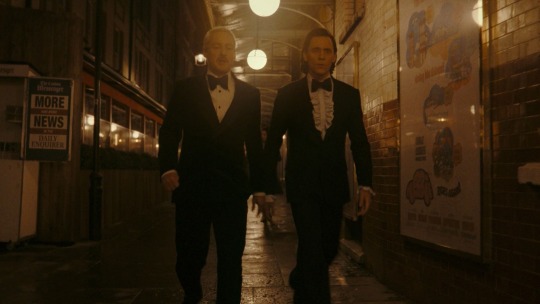
12) Loki defending /saving Mobius from Brad (with magic!) also, Mobius, dear, (my beloved) you were really going for it! Always so ready to fight! I can´t xD
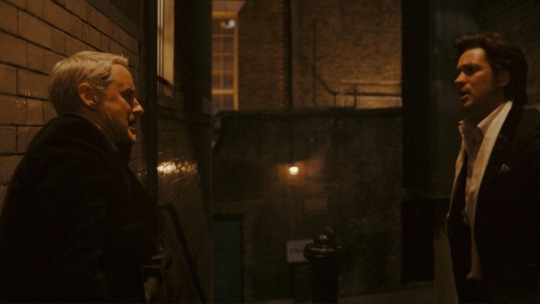
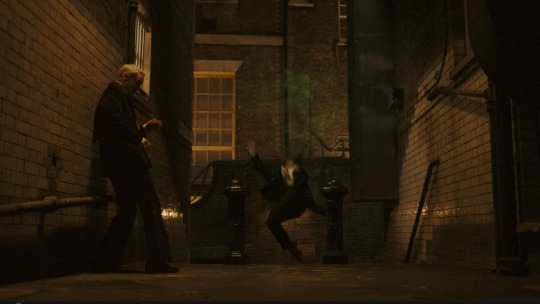
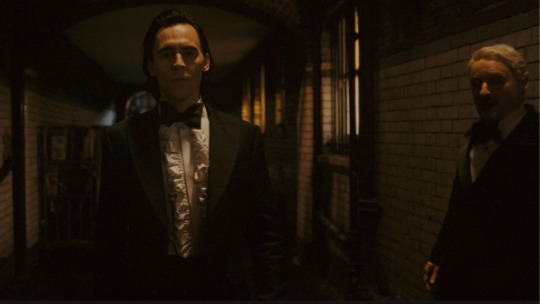
Loki "don´t u dare hurt him" Laufeyson, look at his face!
13) Mobius and Loki struggling to assemble IKEA furniture- sorry Tapmad together
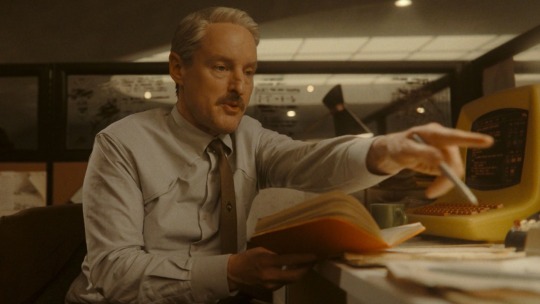
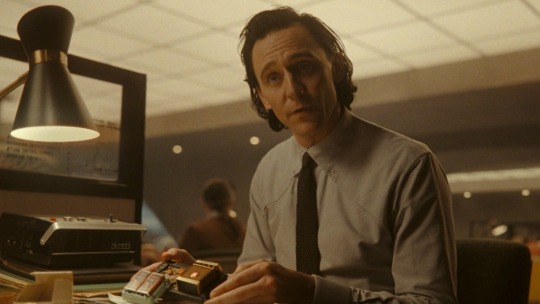
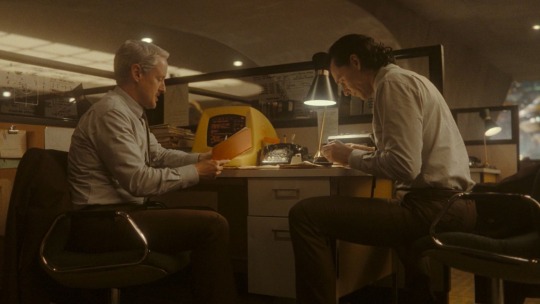
14) " And he knows..." I mean yeah, sure. keep remind us, that Mobius knows everything about Loki, and saw him at his worst, so we can appreciate even more the fact, that Mobius likes him and cares for him so damn much 💚🤎
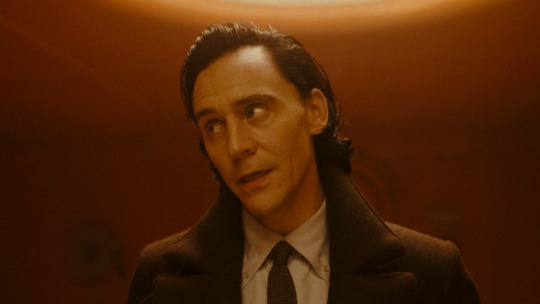
15) Loki finding Mobius´s joke amusing Mobius: cracking joke right after Loki´s threatening speech:
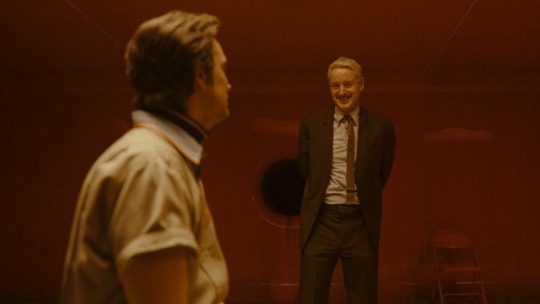
Loki:
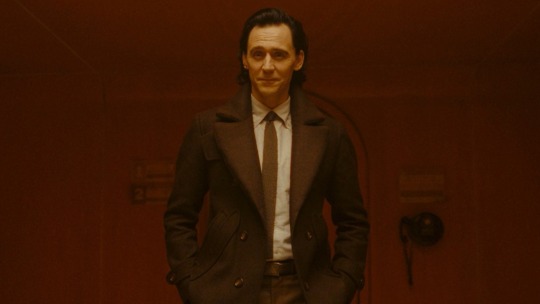
16) Loki being very concerned for Mobius after his outburst, saying that It´s okay, and then suggests having pie because he knows Mobius so well and is avare of the fact, that his man is stress eater I´m gonna cry they´re too pure for MCU someone adopt them
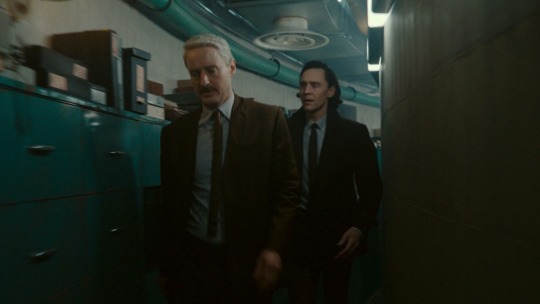
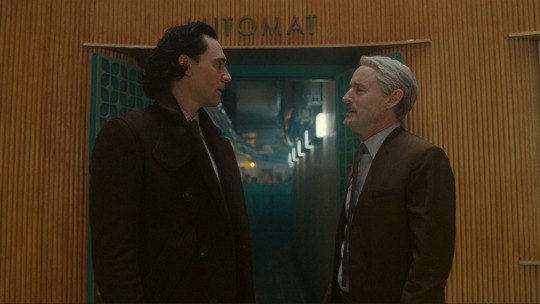
17) Bickering like married couple (part 2) 18) The whole freaking pie scene!
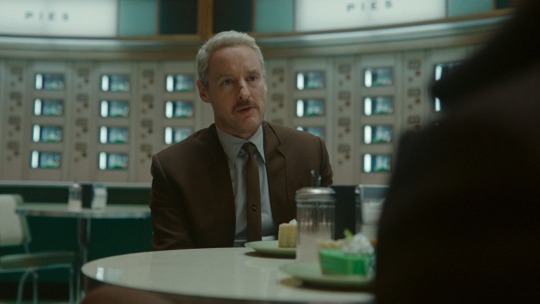
Just them, sharing calm, intimate moment together
Mobius opening up to Loki, and admiting he "lost it"

Loki trying to make him feel better and absolutely KILLING IT! btw, I know, that some people think, this scene doesn´t make sense, because Loki didn´t "lost it" during avengers, but was controlled by mind stone, etc.... well I think that it actually doesn´t matter. Guess what else doesn´t make sense? For example the fact, that they already talked about Loki fighting Avengers ( during their first meeting.) Loki is aware, that Mobius saw New York invasion at least twice now, and he´s telling him anyway. I would say, that point here is Loki trying to lift Mobius´s spirit, entertain him, make him smile. Why else woud he start his monolog by "remember, when...?" And I think, that this is huge, actually: Loki, using his bad memory, defeat, his humulianting experience to make Mobius feel better. So not only, that we see, he no longer care about being rurel but we see him making lightly fun of it FOR MOBIUS´S SAKE! He has different priorities now... our immortal god is a grown man now... it´s just so fucking beautiful... 🥺
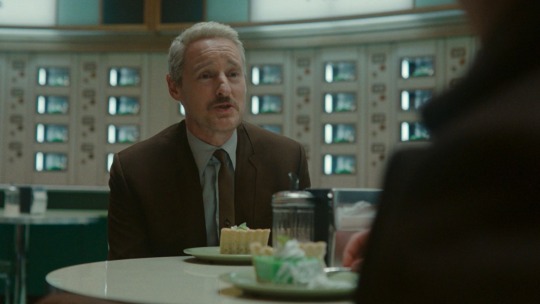
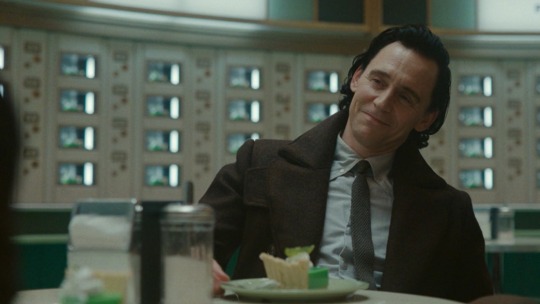
Also Mobius saying to Loki: "come on, you´re the God of Mischief" Like it´s a best thing in the world, and Loki gives him THIS LOOK! (I mean that head tilt would be considered "acting" category, but I´m already making concessions by including all these things under one number :D
19) Loki and Mobius: mischievous duo
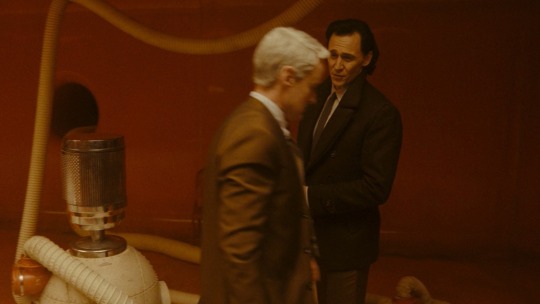
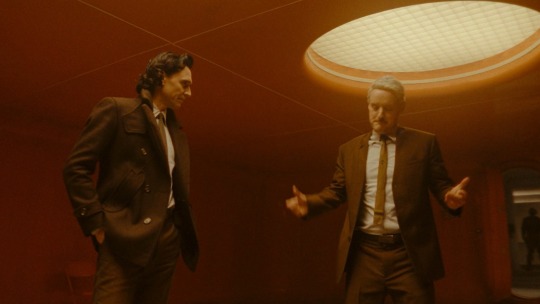
Mobius trusts him so completly!
They both such a drama queens!
And they works so well together!
like... seriously, Brad didn´t see this coming, AT ALL! xD
also... Loki complimenting his plan?!
20) "They say opposites attract. NO." Mobius´s wishfull thinking xD (But hey, it IS true. Opposites attracts. And works greatly together. That´s the only reason, why, for example, trope like grumpy one/sunshine one is so popular!) I can´t! just look at his face 🤣 Oh honey! just calm down
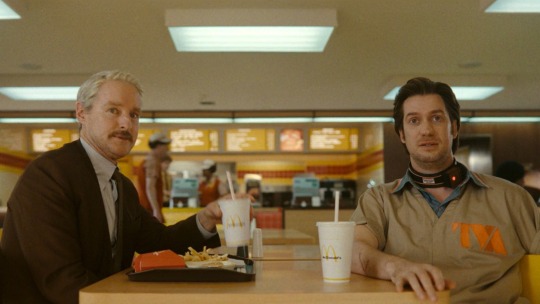
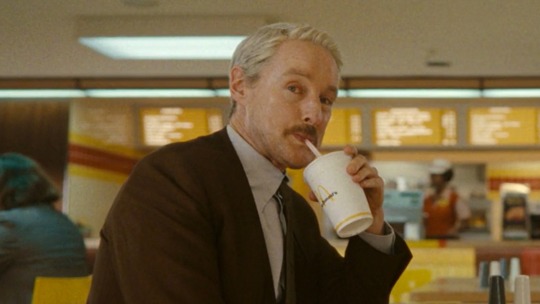
He is sooooooo NOT chill here xD bless him
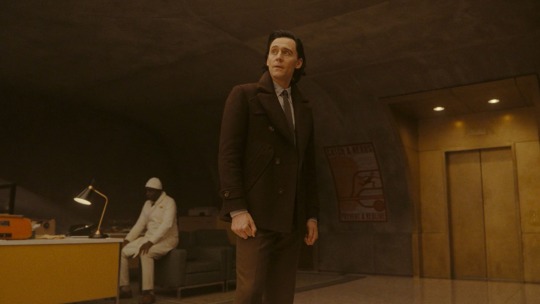
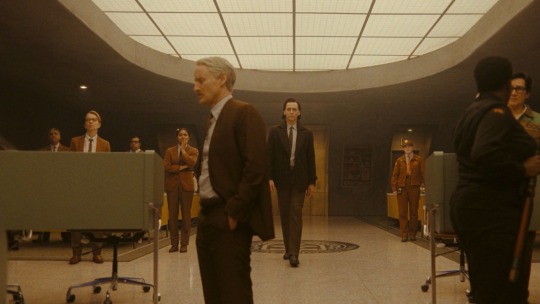
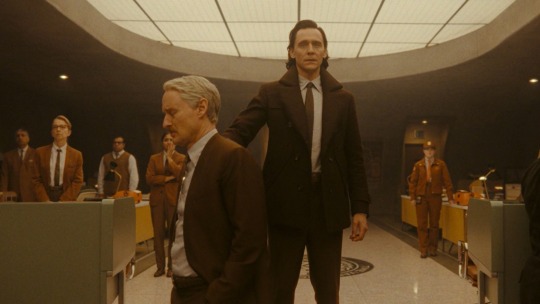
21) Loki, not following Sylvie, but actually staying with Mobius and comforting him. AGAIN. (which is an absolutely glaring contrast compared to episode 2 in first season!)
#loki spoilers#lokius#loki season 2#loki and mobius#MCU#mobius m mobius#mobius#owen wilson#tom hiddleston
212 notes
·
View notes
Text
Why did Fouché feel the need to leave the Oratory in order to enter politics ?
We know that he left the Oratory at the end of the 1791-1792 school year, thinking about entering into marriage. According to his Mémoires, he also thought of making himself a lawyer, but as we all know, this idea did not last long:

“I married in Nantes with the intention of exercising the profession of lawyer, more analogous to my inclinations and to the state of society.”
It was probably his time spent at the Société des Amis de la Constitution de Nantes that later determined his desire to become an elected member of the Republic. Appointed elector to the Saint-Clément section of Nantes in August 1792, after several rounds of voting, he was elected to the deputation on Saturday September 8, 1792. Sixty-one other members of the Convention Nationale were members of the clergy, including Thomas Lindet. Being a member of the church was therefore not a prohibitive condition for sitting at the Assembly.
In his terrible biography, Zweig theorizes: “He allowed himself the freedom of retreat, the possibility of changing and going elsewhere. To the Church he gives himself only temporarily and not entirely” and ”Immediately he leaves the cassock, leaves it to nature to cover his tonsure and makes political speeches, no longer to teenagers, but to the good bourgeois of Nantes. [...] He too wanted to become a bourgeois quickly and completely, at a time when, as he already understood, the Third Estate was going to take first place, the place from which one governs”.
Fouché's choice would therefore be purely a strategic decision, having assessed the political climate and deduced that by marrying a bourgeois woman from Nantes as quickly as possible, he would be part of this caste and have the best chance of being elected.
Except that Zweig doesn't mention a detail of the utmost importance: the conditions required to be elected deputy to the Convention Nationale.
During the session of September 29, 1789, the Assembly had defined what an “active citizen” was, so who had the right to vote and to be elected:
“The committee [in charge of writing the Constitution] proposes that the necessary qualities to enter, as an active citizen, the primary assembly of one's canton, are: [...] not to be at the moment, in a servile state, that is, in personal relationships, too incompatible with the independence necessary for the exercise of political rights”.
However, servitude has been legally non-existent since August 4, 1789, with the decree abolishing feudal rights.
During the session of October 27, 1789, this problem of definition came back to the heart of the debates. Pétion de Villeneuve proposed replacing the term “servile state” with “state of domesticity”. He explains:
“By domestic, we mean commensals, such as schoolteachers, secretaries, librarians, etc.”, which he differentiates from servants, especially valets.
Fouché would therefore not have been threatened in the exercise of his rights because he was a member of the Oratoire, but because of his status as a public schoolteacher, since he was professor of physics.
The definition finally adopted by the Assembly was: “not to be in a state of domesticity, i.e. a hired servant”, which further blurred the distinction between domestics and servants.
The conditions for election to the National Convention are almost identical:
“Art. 2 - The distinction of French citizens between active and non-active citizens will be abolished, and, to be admitted, it will be sufficient to be French, aged twenty-one, domiciled for one year, living on one's income and the product of one's work, and not being in a state of domesticity.”
15 notes
·
View notes
Text
Loki s2e5 Thoughts & Feelings (Spoilers)
THE INTRO LOSING THE LETTERS!! I'm a sucker for when an intro is slightly changed. And in the end credits when the lines and type get all wonky! I love it.
Ok I have a question. When Loki finds everyone, they are all on branched timelines, not the Sacred Timeline. So doesn't that mean the lives on these branches could be slightly different or totally different than their original lives on the Sacred Timeline? Sylvie says they're back in their "real lives", but is that even true? 🤔 Also, I know people are theorizing that Don's wife was dusted during the snap, but technically in this branched timeline, the snap might not have happened.
B-15 being a doctor was so good 🥺 "I looked happy." Yes, you did... I just noticed her name on the captions was "Dr. Willis!"
Don!Mobius said he'd seen Loki in the shop before, did Loki timeslip there and not remember it? Or... has that not happened yet?
OB's workshop looking super similar to the one at the TVA - So cool!
"So I am gonna write a bestseller!" Stop he's so pure!!
Did anyone clock that OB's book cover looks similar to Loki and Slyvie on Lamentis? 👀
"It's impossible. But don't let that stop you."
This is probably obvious but Loki couldn't control the timeslipping until he truly accepted his "why." Not to protect the timelines from HWR, but to protect his friends.
Don!Mobius literally dropping everything to talk to Loki and offer him a drink. Fellas.....
"You saw something in me that I hadn't seen in myself." NO THIS IS STRAIGHT OUTTA FIC THO 😭
I can't believe Loki assembled his own Avengers 😭😭😭
Gawd, the show starting with Loki's speech about how humans don't need choices, and now he's fighting to give his friends choices..... that's the good shit.
"I want my friends back." DO YOU REALIZE THE CHARACTER GROWTH?!?! Loki never had a friend other than Thor. He was so closed off, he didn't think he ever needed anyone else. He told the lie that he was fine, better off, by himself. For him to admit that he has friends, and he wants them, and doesn't want to be alone...? 🤌🤌🤌
"But without them... Where do I belong?" WHERE IS TOM'S EMMY?!?! The tear, the voice shake... this man 😭😭😭
Remember, this Loki is a "cosmetic mistake." He isn't supposed to exist. Mobius saved him from being reset. Without the TVA, without Mobius... he has no reason to exist... no glorious purpose. But he was still willing to let them all go to do the right thing 🥲🥲🥲
Mobius trying to sell a Jet Ski to B-15 is too funny.
THE MONKEY FROM THE INTRO!! I've been wondering what that was all about... we also see OB's sticky note wall!
"The pens... we have all the pens!"
When they all start spagettifying being parallel to the dusting scenes in Infinity War.... RUDE, MARVEL. MR STARK I DON'T FEEL SO GOOD.
"I can rewrite the story." YES YOU CAN KING!! And my immediate reaction was "Loki, God of Stories"! At first I thought Loki and Sylvie were going to run the TVA together, but now I feel like it might be Loki alone (with Mobius' help of course), managing all the timelines... writing the story.
THAT ENDING!!!! I'M SO READY BUT NOT READY FOR NEXT WEEK!!! I can't believe we're at the end.... I'M SO SCARED! 😭
126 notes
·
View notes
Text
Fanfic idea
Charles & Erik are secretly dating (i'd say that they're really not. Just that they don't advertise it & no one has either connected the dots or just asked them). It's 5 times where the X-Men find Charles / Erik looking at eachother lovingly (or w/ desire) & +1 where they're making out.
1- The X-Men & the Brotherhood team up temporarily (& quite spontaneously) to break out some experimented on mutant children from a facility (for some reason Charles had to go, perhaps it was their first official mission & was there as back up?) & the X-Men find Charles staring at Erik while he's bending some metal.
A lot of the Brotherhood (including Erik) & X-Men end up hurt. Charles convines Erik into letting them stay at the mansion to heal.
2- A few days after the mission Charles is giving a speech / assembly to the students (Abt the Brotherhood perhaps?) & they catch Erik staring intensly at Charles w/ a loving gaze.
3- The X-men enter a kitchen & encounter a delicious smell - Erik is cooking. Erik & Charles are talking with eachother abt smth. Erik is giving his back at charles & using his powers manuver the cooking utensiles. Charles is staring the way his muscles move while he does so.
4- Charles is teaching a class outside - one of using mental powers as they all are somewhat similar (this is a hc of mine, that all powers that are of controling smth function similarly). Erik is looking as he teaches, not paying much focus on the actual lesson / the children but more so just looking at Charles, from not very far away. Most of the children dismiss his attendance as for safety purpuses (bc he can stop any dangers from escalating) they still notice tho.
5- The X-men have something to request from Charles late at night. They go into his office & find Charles & Erik locked in a game of chess. They linger at the door before making their existance known, watching 2 or more turns of their game. They see how while Charles is in his turn - looking at the board & thinking - Erik is staring at him (or his lips). They watch Erik glance down as Charles makes his move & the roles are now switched: Erik is thinking of a next move while Charles observes Erik's face (lips). Eventually they make their presence known & the game is stopped temporarily
---
+1- Another day (also late at night) the X-Men need Charles' presence for something trivial (I'm thinking of them needing him to break off a discusion abt a board game?). Expecting their professor & Erik to be just playing chess (as they normally do at an hour like this) they barge into his office & instead of them playing chess they're making out, a forgotten game of chess on the table.
---
Personally I've thought of this fic w/ a movieverse AU (w/o Apocalypse & Dark Phoenix tho) in which everything has been somewhat maintained the same with some tweaks:
1) Raven & Charles treated each other's mutations much better in general - Charles encouraged Raven to use her own skin & she let him stay in her mind w/o overstepping, forming a close thelepathic bond.
2) They didn't end in such bad terms after beach divorce (all of them). They stayed for Charles' recovery but ended up still parting ways (the same mutants as in first class went w the same person they did)
3) No Darwin death & he stayed w/ Charles after beach divorce
4) Angel didn't leave w/ Shaw at the CIA but eventually did w/ Erik to the Brotherhood. The Shaw attack still happened & them going to mansion too (but w Angel)
5) The school wasn't shut down & Charles didn't fall into such a bad depression (the loosing his legs still affected him tho & he still struggled w his alcoholism).
6) Logan still came from the future to convince Raven to not kill Trask but it was much easier. Charles & Erik mended their relationship during this & here is when they begun to date. Erik continued w/ the Brotherood & Charles w/ the school not rlly supporting Erik's ways but they reached a compromise (They didn't). Publicly they still are portrayed as enemies & very much are still somewhat so - even if they're together.
(Erik was still at the pentagon for 10 years. Reason why Charles didn't rescue him sooner was that bc of the school & the Brotherhood the contact between Charles & Raven was practially lost & w/ Erik it was practically non-existant so when eventually they stopped talking he didn't think much of it)
7) [edit] no offsreen character deaths either
-
However I do think this idea fits different canons / AUs. If you do actually want to write this idea feel free to ignore anything abt it that you don't like & change the canon it's in (i have however only watched the moveies & X-Men '97).
Personally I'd think it'd be hilarious if the X-men dont really catch on & kinda dislike Erik. So they're really surprised that they're together (this is my fave in cherik fics it's so sad it's not written more tbh).
Myb eventually I'll write this fic myself but rn I don't have the time nor motivation to do so propertly. So I can only hope that someone capable of doing so can get inspired by this post & do it themselves.
---
If you've read this far thank you for hearing my idea out, I hope it brings others as much joy as this little idea does to me.
18 notes
·
View notes
Text
Embattled South Korean President Yoon Suk-yeol declared martial law on Tuesday in an extraordinary attempt to consolidate his power. But after South Korea’s National Assembly unanimously voted to reject the move, Yoon’s self-coup has ended in a humiliating failure.
Yoon sought to use South Korea’s army to prevent the National Assembly from voting, but politicians from all parties defied the move, and protesters formed human barricades against soldiers. If troops had obeyed Yoon, the crisis could have spiraled, including confrontations between the army and the public. Instead, the army retreated from the National Assembly, and Yoon has announced that he will officially lift martial law in the morning. The crisis is now likely to end with Yoon’s impeachment.
Yoon has been in a budget confrontation, which escalated last week, with the legislature, where his People Power Party suffered sweeping losses in elections this year and the Democratic Party now holds a firm majority. Yoon cited the confrontation in his Tuesday announcement, saying that it was “clear anti-state behavior aimed at inciting rebellion” and accusing the Democratic Party of being “shameless pro-North anti-state forces.”
Yoon’s declaration of martial law was a wildly unexpected move.
Rumors have circulated for months that Yoon might make such an attempt, but mainstream political analysts painted them as fringe conspiracy theories. Martial law under South Korean democracy was envisaged as only a response to war or a major confrontation with North Korea. But while Pyongyang has been taking some worrying steps in recent months—including sending soldiers to aid Russia’s war in Ukraine—there is no military crisis.
Article 77 of the South Korean Constitution gives the president the ability to declare martial law and temporarily execute “special measures” on speech, assembly, and other freedoms during a national emergency. But the National Assembly also has the right to demand that the president cancel martial law with a simple up-and-down vote, as it did just hours after Yoon’s declaration.
Constitutionally, Yoon was bound to obey the legislature, but he took steps to try to prevent it from acting. South Korean army chief Park An-soo, a Yoon ally and the appointed martial law commander, issued a proclamation to block political activity, including that of the National Assembly, and take control of the media. South Korean media did not comply, while Democratic Party leader Lee Jae-myung asked both politicians and the public to gather at the National Assembly building in Seoul.
Using the army against the National Assembly is likely illegal even under the terms of martial law in South Korea, since Article 77 only allows the president to take measures affecting the executive and the judiciary, not the legislature. Yoon was attempting an autogolpe, or self-coup, in which a sitting leader seizes dictatorial power.
Declaring martial law was a desperate move by an unpopular politician who has grappled with crisis since South Korea’s parliamentary elections in April. Yoon, who took office in May 2022, faces a serious influence-peddling scandal, which has contributed to his poor approval ratings. Lately, he has regularly polled under 20 percent among the public.
Still, Yoon retained an audience in Washington due to his tough stance on North Korea. “He has almost always been highly unpopular,” said Karl Friedhoff, an Asia policy fellow at the Chicago Council on Global Affairs. “But for those in D.C., he was saying and doing all the right things. He returned to Cold War rhetoric—calling the progressives North Korea sympathizers, for example. That is something that aligns with the view of many in D.C. about [former South Korean President] Moon Jae-in.”
Many in Yoon’s party announced their opposition to martial law in South Korea, including leader Han Dong-hoon, and the eventual vote to cancel the declaration was an unanimous one among all 190 members who made it to the legislature to vote. Though Han was a protégé of Yoon’s, he has emerged as a political rival in the last year.
People Power Party members such as Han are likely to join the opposition in impeaching the president, which requires 200 of its 300 members to vote to impeach. “I expect the move will net out to giving the opposition—which is well-positioned to win the Blue House in 2027—still more momentum,” said Robert Manning, a fellow at the Stimson Center
The South Korean public assembled in large numbers to protest Yoon’s move and will likely stay in the streets until he goes. The idea of martial law is extremely unpopular in South Korea, where many older people recall its use in 1980 under the military dictatorship of Chun Doo-hwan, a general who seized power after the assassination of former dictator Park Chung-hee. In May 1980, the South Korean military killed scores of protesters in Gwangju, an event now commemorated in South Korea.
South Korea also has an efficient and sophisticated protest infrastructure—built on the experience of life under the dictatorship, decades of protest against the U.S. military presence in the country, and the mass movement that brought down conservative President Park Geun-hye in 2017, in which more than 16 million people took to the streets.
Conscript forces, who may be more unwilling than other soldiers to use force against protesters, make up a slim majority in South Korea’s army. Park tried to use the then-Defense Security Command, a counterintelligence force, to suppress her political enemies and came close to attempting martial law herself amid protests in 2016.
It is unlikely that U.S. politics played a major role in Yoon’s decision to declare martial law. Though the South Korean government has attempted to build ties with U.S. President-elect Donald Trump, President Joe Biden still has more than month left in office; events in Seoul are likely to play out quickly. The Biden administration put out a mealymouthed statement, falling either to back Yoon or wholeheartedly condemn him.
One consequence of the failed coup will be undermining U.S. efforts at Japan-South Korea reconciliation, in which Yoon played a major role—which also cost him politically at home. “In D.C., there just wasn’t enough thought of how failure of domestic policy will have knock-on effects for foreign policy,” Friedhoff said.
8 notes
·
View notes
Text
Aaron Sibarium
July 25, 2024
Princeton University is on the verge of promoting a professor who participated in the occupation of a campus building that disrupted university operations and led to more than a dozen arrests, according to an email reviewed by the Washington Free Beacon.FreeBeacon
The university has recommended that the classics scholar Dan-el Padilla Peralta, who along with 13 anti-Israel student protesters stormed Princeton’s historic Clio Hall in April, be promoted from associate to full professor, pending the approval of the university’s board of trustees. Peralta already has tenure, but the promotion would make him eligible for university leadership roles, including deanships.
"I'm sure you will want to join me in congratulating Dan-el on his promotion to a full professorship," the chair of the classics department, Barbara Graziosi, wrote to her colleagues on July 18. "This is still 'unofficial' news, because the Board of Trustees will have to rubber stamp the recommendation made by the committee that oversees promotions, but I was told I am allowed to share the news internally and do so with glee."
The board is all but certain to accept the recommendation, professors familiar with the matter said, given that the group signs off on virtually all appointments. Princeton and Peralta did notrespond to requests for comment.
The promotion comes as Princeton’s peer universities have taken a soft-on-crime approach to the unlawful and at times violent protests that have rocked campuses since the Oct. 7 terrorist attacks. The Harvard Corporation this month reversed its decision to withhold degrees from 11 students who led an encampment in Harvard yard, one of whom is a Rhodes Scholar set to attend Oxford University next year. Other schools, including Northwestern and Middlebury, ended their encampments by negotiating with protesters and acceding to many of their demands.
At Princeton, Peralta played a leading role in the most disruptive protest the campus had experienced in years. He and another professor, sociologist Ruha Benjamin, joined 13 students in occupying Clio Hall, the home of Princeton’s graduate school administration, as 200 additional protesters cheered them on from the outside.
Police eventually warned the occupiers that they would be arrested if they did not exit the building. Peralta and Benjamin did so, but the students did not.
After a chaotic effort to stop the police—at one point the crowd surrounded a bus where two of the protesters were being held—all 13 students were arrested while the professors who had encouraged them escaped without sanction.
The showdown followed a four day sit-in in the university’s McCosh Courtyard, where several Princeton faculty members, including Peralta, had delivered remarks. Though the sit-in relocated to another part of campus after the occupation of Clio Hall, it was allowed to continue in its new location for over a week.
A classicist who argues that "whiteness" is inseparable from classics, Peralta is perhaps Princeton’s most prominent scholar-activist.
He spearheaded a faculty letter in 2020 that called on the university to give minority professors extra pay and sabbatical time—compensation for their "invisible work," the letter said—and is a vocal supporter of the Boycott, Divestment, and Sanctions movement, which calls for an economic boycott of the Jewish state.
During the sit-in in April, Peralta also proposed a faculty resolution granting amnesty to "students and other university affiliates involved in peaceful free speech and assembly for justice in Palestine." The non-binding resolution passed narrowly in May and condemned the university’s decision to discipline the students who stormed Clio Hall.
Unlike Harvard, which promised harsh sanctions before walking them back, Princeton was lenient from the get-go: A university spokeswoman announced in May that the students were unlikely to get more than probation.
13 notes
·
View notes
Text
Antony after Caesar
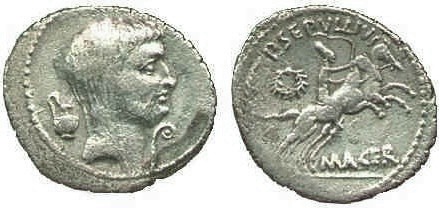
The first coin with Antony's portrait, struck within two months of Caesar's assassination. Antony is shown veiled and bearded as a sign of mourning.
Antony’s career independent of Caesar started with the Ides of March 44 BC. The murder of Caesar sent shock waves through the population, giving rise to diplomatic activities with the purpose of both conciliation and the factionalism, resulting power struggles and eventually civil war. As Caesar’s seeming successor, Antony had to strengthen his own position without provoking immediate conflict. Would he be able to lead the Republic? He held imperium of all the armed forces, which was the most important factor, not only to rise to power, but also to keep it as Sulla, Pompey and Caesar before him. Huzar notes “the fact that Caesar made Senate and Comitia truly ineffectual lies behind the helplessness of these bodies”.
After Caesar’s death Antony brilliantly took control (Cass. Dio 43.27.1; Cic. Ad. Fam. 4.6.3; 6.16; 15.3-4), while also ensuring his safety as he was guarded by his praetorian guards and 6000 veterans. In order to get the mob on his side he swayed them with his passionate speech at Caesar’s funeral by his oratorical talent and his exhibitionism. Even though Suetonius (Jul. 85) says he held no formal speech, Cicero and Plutarch (Ant. 4.3 9-4), among others, describe how he swayed the people to rage, inciting them to burn the body and buildings and assault the murderers. With the acquisition of Caesar’s papers and money Antony was in a strong position. Although Cicero accuses Antony of falsification “on a colossal scale” (Phil. 2.36), and forgery of the papers may have been possible on a practical level, it could not be proven, then or now.
Antony, however, was not deterred by the common belief that he was resorting to forgery; and a little later he obtained a sum of money from the Cretans in return for granting them, again on the authority of Caesar, future exemption from taxation. His justification is that he needed funds for the upholding of his authority, and for winning the support, for instance, of Caesar's veterans; and it is certain that, he spent the bulk of the money in the public interest.
Antony continued to use the popular assembly to ensure Rome and the empire does not fell into anarchy. Cisalpine and Transalpine Gaul for six years, and the retention of four Macedonian legions, which he transferred to Gaul. Since his campaign in Gaul (off and on between 54 and 51 BC), Antony must have realized the importance of being in control of especially Cisalpine Gaul, the “gateway to Italy".
Legislation like municipal legislation on qualifications for holding office and census regulations continued Caesar's plans. Unfortunately, we hear of his programs chiefly from his enemies. When a judiciary law extended eligibility for jury duty to men of centurion and even legionary rank and transferred the hearing of final appeals from the courts to the people, Cicero charged that Antony was packing the courts and fostering mob violence. The democratic measures were never given a fair trial, for with Antony's other measures, they were cancelled in 43 B.C. When Antony failed to hold the scheduled election of the censors owing to the unwillingness of the majority of the senate, but did issue an edict on sumptuary laws, it became the object of ridicule because of his reputation. Nevertheless, that Rome remained calm during these days of transition indicates a strength and stability in Antony's administration of the state.
#mark antony#marcus antonius#julius caesar#rome#roman history#ancient rome#roman republic#roman empire
8 notes
·
View notes
Text

SEASON 1 THROUGH THE EYES OF FLORIBETH DALISAY WITH MENTIONS OF: @fellvespers + @founderscouncil & @silencedrage + @shadowbrn
1x01: in this is the part where you run, there is a five foot three vampire named floribeth dalisay present during the scene where lizzie talks to rafael at the sports field. this vampire wears a necklace with tiny stars, a pastel colored sweater and a skirt and has headphones on. this vampire will be seen again at the end of the episode, during the party at the old mill, where she keeps to herself, drinks a blood bag and stares at the werewolves being rowdy; she stares at one werewolf in particular: jed tien.
1x02: during some people just want to watch the world burn, flori is present at the annual flag football game for wade and wade only. even if he doesn’t really have that big a role. he’s still her friend and she’s there to support him. she’s not really a big sports fan so it’s no skin off her nose whether the salvatore stallions win or lose.
(the dragon girl that hope kills in the woods, however, is the dragon princess from the night world, unbeknownst to anyone.)
1x03: the next time flori appears is in we’re being punked, pedro which means that she, too, got in trouble. well, she got in trouble by proxy because some of the timberwolves taped the flag football game, questioning kaleb’s sudden agility. flori hacked their devices and deleted the video in question and now she’s joining mg, lizzie, hope and josie in the town square.
during this episode it becomes clear that she mostly hangs out with mia hirsch who is flori’s best friend, alongside loren bennett - flori's other best friend. together, they form the anti squad to the super squad.
there is an extra scene in which flori laments about getting in trouble for doing the right thing.
during this episode flori sees donovan lockwood for the first time but the two won’t interact at all until donovan triggers his wolf curse and transfers.
connor throws the milkshake on lizzie and acts as though it was an accident but the milkshake hits mia too. fortunately it’s strawberry and not chocolate, otherwise things would have ended up very ugly. donovan - a bystander to all of this - doesn’t say anything and flori leaves with mia, disappointed in his actions.
once they’re back at the school, lizzie refuses to go back to the square and goes to help out the tiny witch kids which includes everyone’s favorite kiddo pedro.
flori vanishes to her room after double checking and making sure that mia is okay, leaving her with loren; though she promised emma, dorian and alaric she would quit hacking, she intends to get into dana and connor’s devices, either scrambling it or extracting information to be used at a later date, for what they both put mia through.
flori is present in the assembly hall when alaric gives his speech, but she’s only half listening to what he’s saying, busying herself with thoughts of vengeance on certain timberwolves.
1x04: so of course she’d want to join the team during hope is not the goal. connor and dana hurt one of her best friends and this cannot go unpunished. emma tig, however, knows what makes flori tick and explicitly forbids alaric to send flori to mystic falls high. for once, he listens to her.
this means that she’s at the school and present during lunchtime when jed and rafael have their stand off in the mess hall, as she’d been sitting with josie who has been pouring over the curriculum.
later, when it turns out that dana and connor are both incapitated, flori feels bad. they were terrible people, yes, but they didn’t deserve to get hurt and potentially die for it.
flori abandons her short lived revenge plot, choosing instead to focus on researching whoever or whatever the new monster seems to be. because the humans of mystic falls high seem to be dropping like flies.
she doesn't think it's kaleb's fault, although he did feed on cheerleader beula hammond and she's glad when hope, josie and lizzie vanquish the real monster; she's never been a fan of creepy crawlies.
1x05: in malivore, flori wants nothing to do with the honor council. she’s got her own things going on and being on that council would only interfere. flori votes for kaleb over mg.
weirdness aside, landon seems like a nice enough person. flori’s gotten used to his presence and will miss seeing him around - he’s one of the people aside from wade and mg who speaks nerd fluently - but she also understands why he got voted out.
flori is warmer to donovan and is willing to be his friend, seeing in him a lot of what she sees in jed: someone who hides his good heart, someone with the potential to be more than what he is right now; someone who needs a person in their corner. flori is willing to be that person. provided donovan apologizes properly to mia first.
1x06: during mombie dearest, flori drops by the twins’ bedroom while they’re getting ready to drop off her presents for them, and to inform them that she's not coming to their birthday, mere minutes before penelope shows up to deliver the bad news about caroline.
jo and cassie aren’t the only ones brought back: the necromancer also brings back flori’s mom selena, citing that it’s easier to pull people back to life who have a connection to the supernatural. when asked why her dad isn’t here, the necromancer says that her dad already found peace and wouldn’t budge.
flori spends the rest of this episode with her mom, catching her up to speed, only for her to reveal that she knows most things already. selena had been at peace together with raul and they’d been watching her.
when they’re walking to the old mill, she apologizes for the fact that her actions led to their deaths. selena hugs her and says that she is forgiven and that her dad forgives her too.
flori tells her mom that she’s a vampire and her mom takes it in stride. says that she figured it was something like this. it reminded her of the poetry slam flori took her and her husband to before she came out as pansexual. instead of a poetry slam, it’s a zombie slam.
they briefly talk about her friends and about the guy she’s got a crush on. flori’s mom tells her that jed’s rough around the edges but that she likes him so much more than doug carson.
unfortunately they’re attacked by zombies again and both flori and her mom flee, finding refuge within the school.
while the twins siphon the magic keeping her alive from jo, selena crumbles to dust in flori’s arms.
(flori initially assumes that the connection that the necromancer talked about was her being a vampire. later, she’ll find out that selena harman is actually descended from a powerful witch bloodline and chose to erase her memories and bind her powers.)
1x07: rememberance day is never a good day for flori. but during death keeps knocking on my door, she writes two letters as she does every year: one to her parents and one to sue carson.
turns out that the latter also got revived due to having unfinished business.
while the necromancer is being held in a cell, mg and kaleb are snacking on humans and rafael and alaric are figuring out what happened to cassie, flori just wants to spend as much time with sue as she can and lays everything out in the open, apologizing for everything.
sue doesn’t believe her at first, thinking this is all an elaborate joke and expects doug to be in on it, so flori has to show sue her true face. then, sue goes from thinking it’s a joke to being understandably horrified. she backs away, saying she wants to go home; she wants nothing to do with flori, either. not even when she feels her end coming.
though it breaks her heart to do so, flori says her goodbyes and tries her best to honor that decision.
flori ends the episode with putting the letters in an old shoebox at the back of her closet in which she keeps them all. but not before taking a picture of them on her phone. for safe keeping.
1x08: in maybe i should start from the end, flori is still reeling from everything that happened prior.
not only is she still mourning her parents and sue all over again - her former roommate - a witch called druscilla isobel saitou, makes it clear that she’s gonna have loren in her coven - druscilla collects powerful witches, see. it sucks because druscilla had been nice at first. perfectly pleasant, if a bit dark. she also badgers flori about her very obvious crush on jed, reminding her that there’s a chance she’ll have to bury him - and everyone she’ll ever love - in the end.
landon’s brought back home and when flori overhears hope muttering something about triad industries to herself, she once again resumes digging into them again.
1x09: exam week rolls around soon afterwards and not even flori - who has always been a meticulous student and is known for her good grades - is immune to stress, nightmares and the trappings of the night hag slash oneiroi in what was hope doing in your dreams?
flori’s nightmares are mostly about sue and her parents but there are also flashes of the memory she’s repressed about the time she got turned into a vampire by derek machado (who is, indeed, related to ethan, maya and sherriff machado) and other deep seated fears like getting captured by triad industries and having her fangs pulled out of her mouth without anaesthesia.
she ends the episode in the library at first, talking to dorian. he suggests, gently, that she should go and see emma.
1x10: in there’s a world where your dreams came true, flori appears in each of lizzie’s quote-unquote ‘dream worlds’.
in the first reality, flori has arrived shortly before jed does and watches while he gets the tour. when asked why she stuck around in the first place, flori reveals that she has nowhere else to go.
in the second reality, flori is a transfer student from maple hollows high and a bit of a delinquent who uses her skills for favors or extra cash; she hides the fact that she’s a vampire but yearns for a place where she can openly flash her fangs. when the students of the mikaelson school roll up, flori is quick to leave with them.
in the third reality, flori is on her own while triad wages war against all supernatural creatures. flori’s attempts at exposing triad for being shady backfired: her parents died and sue died as well. wade died in front of her eyes too and she’s lost sight of loren and mia. after getting out of the triad industries detention facility, her plan is to wait it out in one of the bunkers she stumbled upon. but when jed accidentally breaks into said bunker, flori joins forces with him and, together with kaleb, takes lizzie to find alaric and the resistance, where flori earns her keep by helping with communications.
1x11: flori is determined to once again stay out of the limelight in we’re gonna need a spotlight. she knows how to warble a tune and hold one too but has a severe case of stage fright. when pressed, flori says that just like landon, she doesn’t sing in front of people.
later, kaleb and mg rock the house down and flori sits in the front row, cheering loudly. she also cheers during the talent show redo when josie sings and when the vampires do a sit in protest during the second go around, flori slips out the door, intending to hang out with loren and mia, whose enrollment in the school is now finalized.
1x12: during there’s a mummy on main street, it is revealed that flori is actually the one who told josie about the biggest ball of yarn in the country. it is also revealed that flori hails from maple hollows.
extra episode: there would be an extra episode detailing flori’s backstory pre enrolling as a year-round student at the salvatore boarding school, including the way in which she got turned.
it is set before the boy who still has a lot of good to do and after there’s a mummy on main street in season 1 called the girl who does not remember where she came from will never reach her destination. which is a mouthful but it’s chosen for a reason.
this is actually a filipino proverb that not only ties into flori’s culture - i feel like her dad, especially, would be fond of proverbs like this - but also introduces her as a character because the way flori got turned by derek was so traumatic that she repressed the memory until she worked on it and through it with emma.
(personally i also feel like that episode title nods to finch, who is also filipina, too because finch repressed the memory of her turning into a werewolf as well due to it also being traumatic.)
it also ties her to her mom selena harman-dalisay who drank from the cup of lethe, becoming a lost witch after she thought she lost not only her younger sisters but their kids as well.
(fortunately, the kids survived, but that’s for later seasons.)
this episode title deliberately mirrors mg’s, tying their triad stories together.
1x13: in the boy who still has a lot of good to do, flori joins the impromptu roadtrip to visit mg’s parents but never comes back. most of the events play out as they do on the show, except veronica recognizes and remembers flori and remembers her hacking into the triad industries database.
veronica knocks her out with vervain and holds in the basement of the greasley house where veronica intends to question her, making it clear that she is not above using extreme methods, if necessary.
said extreme methods come in the form of ying liu, who injects flori with a self made chemical compound, serving as a truth serum. unfortunately, it's a powerful compound and flori ends up telling ying everything. there's a burn wound on her left elbow where ying dipped the syringe into a vervain solution before injecting it directly into her bloodstream.
at some point after the interrogation, flori blacks out.
1x14: during let’s just finish the dance, flori’s not present and wade gets more and more pissed off with the fact that people are having a fucking pageant instead of looking for floribeth! like, hello?! priorities, people!
when it becomes clear that neither the super squad nor the adults give a fuck, he takes matters in his own hands and informs his crush brock - who sees it fit to inform rafael and jed, just in case wade calls upon brock to help out - as well as mia and loren.
wade leaves a note for donovan, too.
throughout the episode, it becomes clear that wade only pretends to be a bumbling fool; he’s actually rather shrewd and cuts deals left and right. he knows what’s going on in and around the school at all times.
1x15: in i’ll tell you a story, flori awakens at triad industries, next to landon.
veronica tells flori that she’s the one who ordered the hit on her parents after she caught flori hacking into the database; she actually wanted flori dead for her transgressions but when it turned out she wasn’t home, she ordered her firing squad to take out flori’s parents instead, to send a message. out of the goodness of her heart, she told them to make it look like an accident, too. veronica didn’t have to do that, but she did. because she’s no monster. and really, if flori hadn’t been snooping, none of this would have happened in the first place.
she tells clarke to prep flori for transport to the triad industries detention facility. she also tells clarke to tie up loose ends and throw landon into the pit.
then, she leaves. clarke unties landon, who in turn unties flori. clarke beseeches landon to help him, but he refuses at first. flori, on the other hand, is more willing to cooperate. even if everything about triad is shady as hell.
clarke escapes with landon and wade rescues flori. they hug and wade mutters wetly that they’re even now because flori got him out of the zetes institute.
1x16: triad storms the school in there’s always a loophole and flori runs into kaleb while he’s trying to get the kids out and to the bus. she, wade and the others help with that.
after the siege, flori is one of the many students sitting in the assembly hall. alaric comes clean about everything and gets voted out.
the episode ends with loren and flori laying on the floor of loren’s bedroom; flori reads a text aloud, it’s from mia telling them she’s on her way from the kitchen with snacks. loren tells flori that bonnie will come back to teach at the salvatore boarding school in the fall now that alaric’s booted out.
#long post /#floribeth dalisay / headcanons; metas and world building.#//this is sort of a redux / compilation of my two rewrites with updated canons#//to the people whose muses i wrote into the story: if this is not their proper place - if they appear in later episodes or seasons pls let#//me know#//also @ the people whose muses i mentioned: all your kids are just so intertwined with flori now i can't imagine her without them#queue.
3 notes
·
View notes